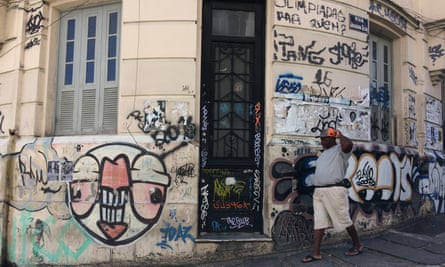It was Rio’s equivalent of the Blue Note or Ronnie Scott’s, a legendary downtown samba club famed for its caipirinha-fuelled jam sessions and for spawning some of the best young musicians in town.
Today, though, Bar Semente lies abandoned, a graffiti-covered symbol of the city’s post-mega-event slump. An epitaph has been sprayed on its facade: “The Olympics, for who?”
“It was the most difficult decision – … so difficult and so lonely,” Aline Brufato, Semente’s owner for most of its 20-year existence, said of her decision to close late last year: “But it couldn’t go on.”
The Rio-based producer blamed a cocktail of economic, political and social factors for the demise of a club whose patrons had included Sting, Dave Matthews and Norah Jones, as well as giants of Brazilian music, such as Chico Buarque, Ney Matogrosso, João Bosco and Yamandu Costa.

Part of the problem was government neglect, which had condemned Lapa, the crumbling bohemian district where Semente was located, to spiralling levels of violence and homelessness.
“Lapa could be like Montmartre, or Le Marais, or New York’s [Greenwich] Village or Alfama in Portugal. But [for authorities] Lapa isn’t interesting, Lapa’s a problem,” Brufato said during an interview in the office of her hilltop home overlooking its iconic 19th century viaduct.
Brazil’s recession, which hit Rio state particularly hard, also helped seal Semente’s fate. “Some people want to just blame violence but it wasn’t just the violence. It was the economic crisis,” said Zé Paulo Becker, a celebrated Brazilian guitarist who had hosted a Monday night instrumental jam session since 2004.
“People didn’t have the money to go out … Here in Rio state we have lots of civil servants, and they weren’t paying the civil servants. So how is someone going to go out to consume culture?
“It’s sad. The other day I was passing through Lapa … and I couldn’t believe it … It was empty: five years ago it would never have been like that.”
In a recent interview with the Rio paper O Globo, the owner of another storied local bar, Nova Capela, admitted he was struggling to stay afloat. “Lapa,” he lamented, “is more dead than alive.”

Semente’s closure is part of a wider crisis affecting Rio’s music community – not to mention the city itself, shaken by the still unsolved murder of the councillor Marielle Franco and a controversial military intervention purportedly aimed at combating heavily armed violence.
The scale of Rio’s security shambles was highlighted earlier this month when a fierce and highly unusual gunfight broke out beside Sugarloaf mountain and six bullet-riddled corpses washed up on a nearby beach. Last week a 14-year-old schoolboy was killed when a police helicopter opened fire on a densely-populated favela.
A generation of young virtuoso musicians cut their teeth on Semente’s minuscule stage, going on to record albums and – in the case of one singer, Teresa Cristina – pack concert halls around the country. Many of those players, however, are now packing their bags and looking for opportunities overseas.
“You’ve had a real disbanding of people,” said Brufato, 41, reeling off the names of nearly a dozen musicians and singers who have fled to cities including Lisbon, New York and Montreal in recent months.
Becker, 49, said he had lost two members of his group. “The country is going through a moment of crisis. When you freeze 20 years of investment in education and culture, there’s a price to be paid … I don’t want to give a pessimistic account of things. But we are seeing the reality.”
For those who have stayed, Semente’s closure has left a void.

“Semente was somewhere you could compose, where you could take risks, where you could improvise,” Becker recalled. “It was like a second home … and as time goes by the penny starts to drop and we start to realise how much we miss this space.”
“Lots of artists were kind of orphaned,” said Alessandro Brandão, one half of a drag queen samba duo called Sara and Nina who got their first break at the club. “Semente built an audience for a certain type of music and suddenly it was gone. It was really dispiriting.”
Gabriel Sanches, the duo’s other half, said Semente’s closure had been a wake-up call to the wider challenges facing Brazilian society and the need to fight back against the country’s swing to the right. “It made me think: ‘Caramba! Things really are bad!’ This crisis, the difficulties – and in a broader sense – the censorship, the repression, the growing conservatism.”
Brufato insisted Rio’s musicians would bounce back; some displaced performers have found a new home on the stage of a local branch of the Blue Note, which opened in the chic Lagoa neighbourhood last year and will next month start hosting its own Semente-themed nights.
“The Semente generation is out there, alive and kicking,” she said.

“Brazil is such a musical country,” agreed Becker. “I have the feeling that at any moment [Semente] could come back. I believe this,” he added with a laugh. “We have to believe.”
On a recent evening, the lights were out over Semente’s once buzzing stage but painted on a decaying wall across the street, next to a homeless encampment, was a quote from the late Brazilian poet Ferreira Gullar, echoing like a message of resistance: “Art exists because life is not enough.”
